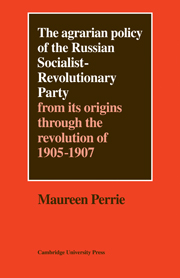 The Agrarian Policy of the Russian Socialist-Revolutionary Party
The Agrarian Policy of the Russian Socialist-Revolutionary Party Published online by Cambridge University Press: 07 October 2011
In the first two years of its existence, the Agrarian-Socialist League issued two editions, of 1,000 copies each, of ‘The immediate question of the revolutionary cause’; also five propaganda pamphlets for the peasantry: ‘How the Minister takes care of the peasants’ and ‘How the Hungarian peasants are fighting for their rights’, each in editions of 1,000 copies; ‘Peasant unions in Sicily’, ‘Sketches from Russian history’ and ‘Conversations about the land’, each in editions of 2,000 copies. The first copies of these pamphlets to reach the propagandists working in Russia evoked such a favourable response that the League was soon overwhelmed by requests for more literature than its slender finances could afford to publish. The problem of supply was exacerbated by the hazards of smuggling the illegal literature into Russia. At the end of 1901 the League discovered that N. K. Pauli, who had been in charge of transportation, was an agent provocateur in the pay of the secret police, who had thus intercepted most of the literature at the frontier.
The arrival in Russia of the first publications of the Agrarian-Socialist League was particularly welcomed by a group of Socialist-Revolutionary intellectuals in Saratov, on the Volga. Throughout the 1890s, Saratov had been a major stronghold of neo-Populism; like Tambov, it was one of those provincial towns on the periphery of European Russia in which political exiles were allowed to reside, under police supervision, after their return from Siberia. Another similarity with Tambov was the existence of a relatively liberal and enlightened zemstvo, which promoted educational and cultural activities which could be utilised for purposes of political discussion.
To save this book to your Kindle, first ensure no-reply@cambridge.org is added to your Approved Personal Document E-mail List under your Personal Document Settings on the Manage Your Content and Devices page of your Amazon account. Then enter the ‘name’ part of your Kindle email address below. Find out more about saving to your Kindle.
Note you can select to save to either the @free.kindle.com or @kindle.com variations. ‘@free.kindle.com’ emails are free but can only be saved to your device when it is connected to wi-fi. ‘@kindle.com’ emails can be delivered even when you are not connected to wi-fi, but note that service fees apply.
Find out more about the Kindle Personal Document Service.
To save content items to your account, please confirm that you agree to abide by our usage policies. If this is the first time you use this feature, you will be asked to authorise Cambridge Core to connect with your account. Find out more about saving content to Dropbox.
To save content items to your account, please confirm that you agree to abide by our usage policies. If this is the first time you use this feature, you will be asked to authorise Cambridge Core to connect with your account. Find out more about saving content to Google Drive.